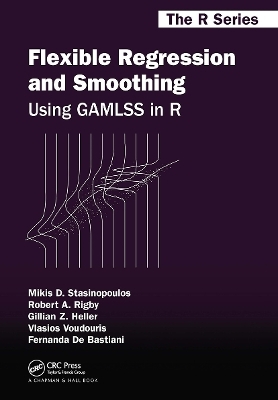
Flexible Regression and Smoothing
Using GAMLSS in R
Seiten
2020
Chapman & Hall/CRC (Verlag)
978-0-367-65806-9 (ISBN)
Chapman & Hall/CRC (Verlag)
978-0-367-65806-9 (ISBN)
This book provides a broad overview of GAMLSS methodology and how it is implemented in R. It includes a comprehensive collection of real data examples, integrated code, and figures to illustrate the methods, and is supplemented by a website.
This book is about learning from data using the Generalized Additive Models for Location, Scale and Shape (GAMLSS). GAMLSS extends the Generalized Linear Models (GLMs) and Generalized Additive Models (GAMs) to accommodate large complex datasets, which are increasingly prevalent.
In particular, the GAMLSS statistical framework enables flexible regression and smoothing models to be fitted to the data. The GAMLSS model assumes that the response variable has any parametric (continuous, discrete or mixed) distribution which might be heavy- or light-tailed, and positively or negatively skewed. In addition, all the parameters of the distribution (location, scale, shape) can be modelled as linear or smooth functions of explanatory variables.
Key Features:
Provides a broad overview of flexible regression and smoothing techniques to learn from data whilst also focusing on the practical application of methodology using GAMLSS software in R.
Includes a comprehensive collection of real data examples, which reflect the range of problems addressed by GAMLSS models and provide a practical illustration of the process of using flexible GAMLSS models for statistical learning.
R code integrated into the text for ease of understanding and replication.
Supplemented by a website with code, data and extra materials.
This book aims to help readers understand how to learn from data encountered in many fields. It will be useful for practitioners and researchers who wish to understand and use the GAMLSS models to learn from data and also for students who wish to learn GAMLSS through practical examples.
This book is about learning from data using the Generalized Additive Models for Location, Scale and Shape (GAMLSS). GAMLSS extends the Generalized Linear Models (GLMs) and Generalized Additive Models (GAMs) to accommodate large complex datasets, which are increasingly prevalent.
In particular, the GAMLSS statistical framework enables flexible regression and smoothing models to be fitted to the data. The GAMLSS model assumes that the response variable has any parametric (continuous, discrete or mixed) distribution which might be heavy- or light-tailed, and positively or negatively skewed. In addition, all the parameters of the distribution (location, scale, shape) can be modelled as linear or smooth functions of explanatory variables.
Key Features:
Provides a broad overview of flexible regression and smoothing techniques to learn from data whilst also focusing on the practical application of methodology using GAMLSS software in R.
Includes a comprehensive collection of real data examples, which reflect the range of problems addressed by GAMLSS models and provide a practical illustration of the process of using flexible GAMLSS models for statistical learning.
R code integrated into the text for ease of understanding and replication.
Supplemented by a website with code, data and extra materials.
This book aims to help readers understand how to learn from data encountered in many fields. It will be useful for practitioners and researchers who wish to understand and use the GAMLSS models to learn from data and also for students who wish to learn GAMLSS through practical examples.
Mikis D. Stasinopoulos, Robert A. Rigby, Gillian Z. Heller, Vlasios Voudouris, Fernanda De Bastiani
Part I Introduction to models and packages
Why GAMLSS?
Introduction to the gamlss packages
Part II The R implementation: algorithms and functions
The Algorithms
The gamlss() function
Methods for fitted gamlss objects
Part III Distributions
The gamlss.family of distributions
Finite mixture distributions
Part IV Additive terms
Linear parametric additive terms
Additive Smoothing Terms
Random effects
Part V Model selection and diagnostics
Model selection techniques
Diagnostics
Part VI Applications
Centile Estimation
Further Applications
| Erscheinungsdatum | 01.10.2020 |
|---|---|
| Reihe/Serie | Chapman & Hall/CRC The R Series |
| Sprache | englisch |
| Maße | 178 x 254 mm |
| Gewicht | 1100 g |
| Themenwelt | Mathematik / Informatik ► Mathematik |
| Wirtschaft ► Volkswirtschaftslehre ► Ökonometrie | |
| ISBN-10 | 0-367-65806-2 / 0367658062 |
| ISBN-13 | 978-0-367-65806-9 / 9780367658069 |
| Zustand | Neuware |
| Haben Sie eine Frage zum Produkt? |
Mehr entdecken
aus dem Bereich
aus dem Bereich
Übungsaufgaben – Fallstudien – Lösungen
Buch | Softcover (2022)
De Gruyter Oldenbourg (Verlag)
CHF 34,90
mit Aufgaben, Klausuren und Lösungen
Buch | Softcover (2023)
UTB (Verlag)
CHF 34,85
Set aus Lehr- und Arbeitsbuch
Buch | Softcover (2022)
De Gruyter Oldenbourg (Verlag)
CHF 49,95


